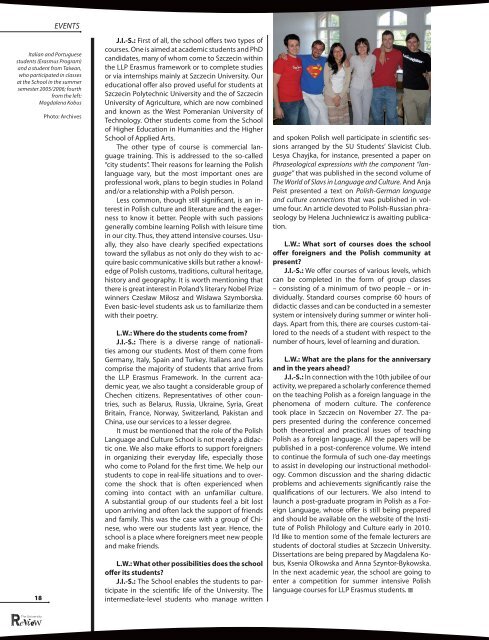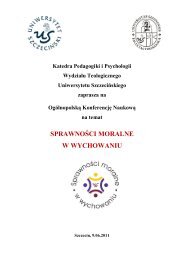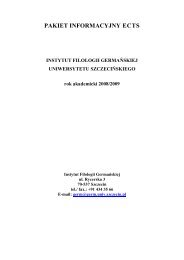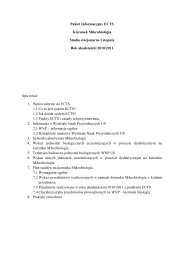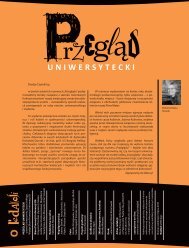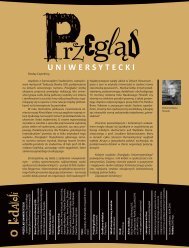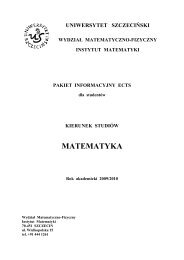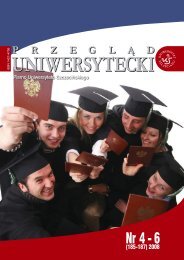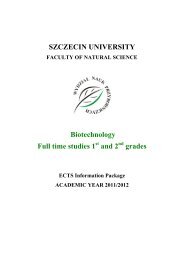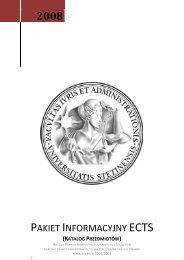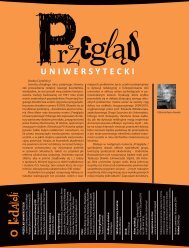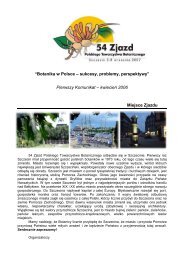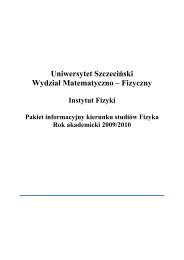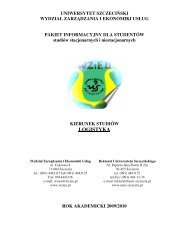The University
The University
The University
You also want an ePaper? Increase the reach of your titles
YUMPU automatically turns print PDFs into web optimized ePapers that Google loves.
Italian and Portuguese<br />
students (Erasmus Program)<br />
and a student from Taiwan,<br />
who participated in classes<br />
at the School in the summer<br />
semester 2005/2006; fourth<br />
from the left:<br />
Magdalena Kobus<br />
18<br />
EVENTS<br />
Photo: Archives<br />
J.I.-S.: First of all, the school offers two types of<br />
courses. One is aimed at academic students and PhD<br />
candidates, many of whom come to Szczecin within<br />
the LLP Erasmus framework or to complete studies<br />
or via internships mainly at Szczecin <strong>University</strong>. Our<br />
educational offer also proved useful for students at<br />
Szczecin Polytechnic <strong>University</strong> and the of Szczecin<br />
<strong>University</strong> of Agriculture, which are now combined<br />
and known as the West Pomeranian <strong>University</strong> of<br />
Technology. Other students come from the School<br />
of Higher Education in Humanities and the Higher<br />
School of Applied Arts.<br />
<strong>The</strong> other type of course is commercial language<br />
training. This is addressed to the so-called<br />
“city students”. <strong>The</strong>ir reasons for learning the Polish<br />
language vary, but the most important ones are<br />
professional work, plans to begin studies in Poland<br />
and/or a relationship with a Polish person.<br />
Less common, though still significant, is an interest<br />
in Polish culture and literature and the eagerness<br />
to know it better. People with such passions<br />
generally combine learning Polish with leisure time<br />
in our city. Thus, they attend intensive courses. Usually,<br />
they also have clearly specified expectations<br />
toward the syllabus as not only do they wish to acquire<br />
basic communicative skills but rather a knowledge<br />
of Polish customs, traditions, cultural heritage,<br />
history and geography. It is worth mentioning that<br />
there is great interest in Poland’s literary Nobel Prize<br />
winners Czesław Miłosz and Wisława Szymborska.<br />
Even basic-level students ask us to familiarize them<br />
with their poetry.<br />
L.W.: Where do the students come from?<br />
J.I.-S.: <strong>The</strong>re is a diverse range of nationalities<br />
among our students. Most of them come from<br />
Germany, Italy, Spain and Turkey. Italians and Turks<br />
comprise the majority of students that arrive from<br />
the LLP Erasmus Framework. In the current academic<br />
year, we also taught a considerable group of<br />
Chechen citizens. Representatives of other countries,<br />
such as Belarus, Russia, Ukraine, Syria, Great<br />
Britain, France, Norway, Switzerland, Pakistan and<br />
China, use our services to a lesser degree.<br />
It must be mentioned that the role of the Polish<br />
Language and Culture School is not merely a didactic<br />
one. We also make efforts to support foreigners<br />
in organizing their everyday life, especially those<br />
who come to Poland for the first time. We help our<br />
students to cope in real-life situations and to overcome<br />
the shock that is often experienced when<br />
coming into contact with an unfamiliar culture.<br />
A substantial group of our students feel a bit lost<br />
upon arriving and often lack the support of friends<br />
and family. This was the case with a group of Chinese,<br />
who were our students last year. Hence, the<br />
school is a place where foreigners meet new people<br />
and make friends.<br />
L.W.: What other possibilities does the school<br />
offer its students?<br />
J.I.-S.: <strong>The</strong> School enables the students to participate<br />
in the scientific life of the <strong>University</strong>. <strong>The</strong><br />
intermediate-level students who manage written<br />
and spoken Polish well participate in scientific sessions<br />
arranged by the SU Students’ Slavicist Club.<br />
Lesya Chayjka, for instance, presented a paper on<br />
Phraseological expressions with the component “language”<br />
that was published in the second volume of<br />
<strong>The</strong> World of Slavs in Language and Culture. And Anja<br />
Peist presented a text on Polish-German language<br />
and culture connections that was published in volume<br />
four. An article devoted to Polish-Russian phraseology<br />
by Helena Juchniewicz is awaiting publication.<br />
L.W.: What sort of courses does the school<br />
offer foreigners and the Polish community at<br />
present?<br />
J.I.-S.: We offer courses of various levels, which<br />
can be completed in the form of group classes<br />
– consisting of a minimum of two people – or individually.<br />
Standard courses comprise 60 hours of<br />
didactic classes and can be conducted in a semester<br />
system or intensively during summer or winter holidays.<br />
Apart from this, there are courses custom-tailored<br />
to the needs of a student with respect to the<br />
number of hours, level of learning and duration.<br />
L.W.: What are the plans for the anniversary<br />
and in the years ahead?<br />
J.I.-S.: In connection with the 10th jubilee of our<br />
activity, we prepared a scholarly conference themed<br />
on the teaching Polish as a foreign language in the<br />
phenomena of modern culture. <strong>The</strong> conference<br />
took place in Szczecin on November 27. <strong>The</strong> papers<br />
presented during the conference concerned<br />
both theoretical and practical issues of teaching<br />
Polish as a foreign language. All the papers will be<br />
published in a post-conference volume. We intend<br />
to continue the formula of such one-day meetings<br />
to assist in developing our instructional methodology.<br />
Common discussion and the sharing didactic<br />
problems and achievements significantly raise the<br />
qualifications of our lecturers. We also intend to<br />
launch a post-graduate program in Polish as a Foreign<br />
Language, whose offer is still being prepared<br />
and should be available on the website of the Institute<br />
of Polish Philology and Culture early in 2010.<br />
I’d like to mention some of the female lecturers are<br />
students of doctoral studies at Szczecin <strong>University</strong>.<br />
Dissertations are being prepared by Magdalena Kobus,<br />
Ksenia Olkowska and Anna Szyntor-Bykowska.<br />
In the next academic year, the school are going to<br />
enter a competition for summer intensive Polish<br />
language courses for LLP Erasmus students.


